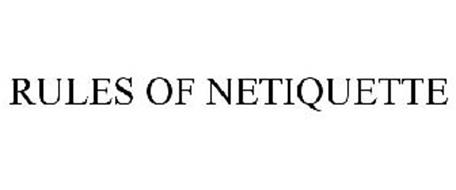

- #Rules of netiquette full#
- #Rules of netiquette password#
We reserve the right to exclude users from our channels in the event of serious or repeated violations of our netiquette. We will delete or hide any individual posts that violate these rules. Specific rules apply to discussions on all the social media channels of the Arolsen Archives. Please take care not to violate any copyrights. All citations must be identified as such. Please make sure your posts are constructive and do not contain inflammatory language. It is important to us that discussions are always open, polite, and respectful. Netiquette for Kids, created 2001 by Boston Public Library, is licensed under a Creative Commons Attribution-ShareAlike 3.0 Unported License.We are pleased when our posts generate discussions between users, and we welcome your comments and suggestions. Who knows? They might show you a thing or two someday! Other kids, or even your parents and teachers, may need help understanding what it’s all about. The Net is growing quickly, and it’s difficult to keep up.
Help other people learn more about the Net.Chances are someone else taught you a lot of what you know about the Internet. Taking things which are not yours (such as files, passwords, or credit card numbers), spreading rumors about other people online, and infecting other computers with viruses (on purpose) are examples of harming other people online. Avoid using the computer to harm other people. Be responsible online.When you are at the computer, you are in control. Passwords and personal information are private, and are never safe to share with others. #Rules of netiquette password#
Sharing your own password with someone else, even someone you like, is never a good idea.
#Rules of netiquette full#
This includes passwords, full names, addresses, or interests.
Respect the privacy of other people.If someone tells you something secret, it should be kept secret. If you join the discussion just for the fun of “crashing” it, or ruining it, people will definitely get angry. This can be done on a listserv, a bulletin board, a chat group, etc. Avoid “crashing” discussion groups or forums.People on the Net frequently get together online to talk about things they may have in common. Try being calm, ignoring the message, or sending a polite message asking for them to explain what they meant. Even if you are angry with someone, you don’t need to take things any further. If someone insults you, be calm.Starting a flame war is serious business on the Net. If you insult someone with e-mail, they will probably get angry just as they would if you insulted them face to face. Sometimes this can be done by sending so many messages that a mailbox gets jammed, and sometimes this is done by sending a few very nasty messages meant to hurt someone’s feelings. Avoid insulting someone unless you want to start a flame war.A flame war is when angry people try to punish each other with e-mail. If someone sends you e-mail which threatens you or makes you feel uncomfortable, talk to a parent or other adult right away. If someone sends you a threatening letter, or makes crank phone calls to your house, it can be annoying and sometimes very scary. Respect other people’s online rights.People on the Internet have rights just as they do in everyday life. 
You can do this by using smileys, such as :). When you write an e-mail message, make sure the person you’re sending it to will know whether you are happy, sad, angry, joking, etc. Avoid hurting someone’s feelings with e-mail.Sometimes, online, people can’t tell that you are joking.






 0 kommentar(er)
0 kommentar(er)
